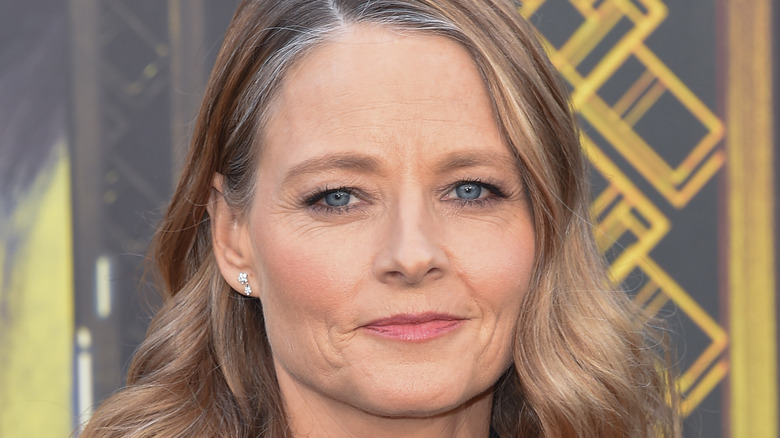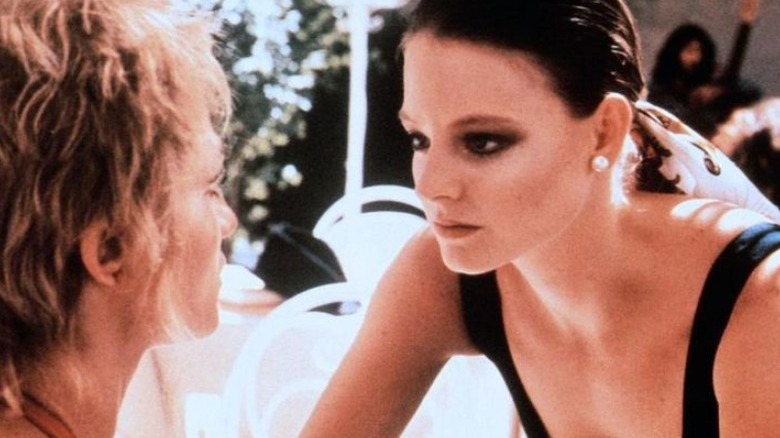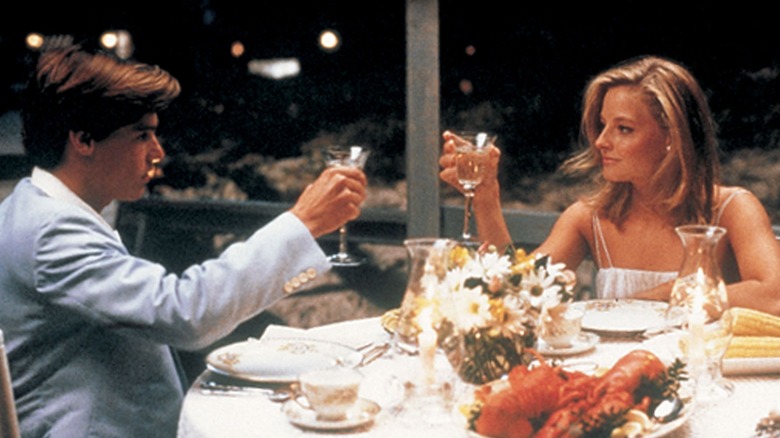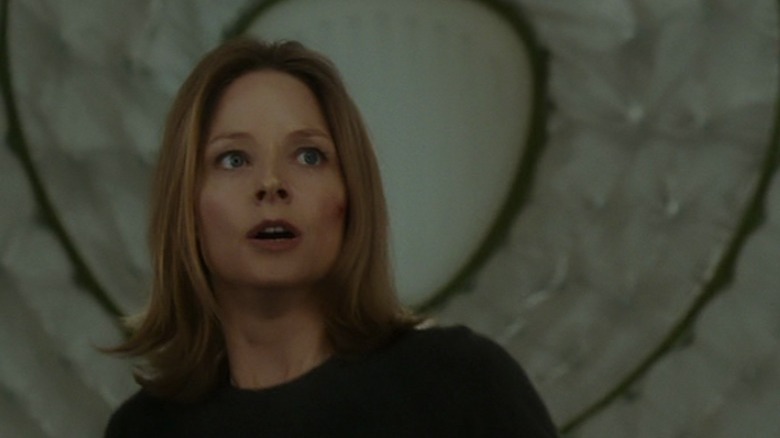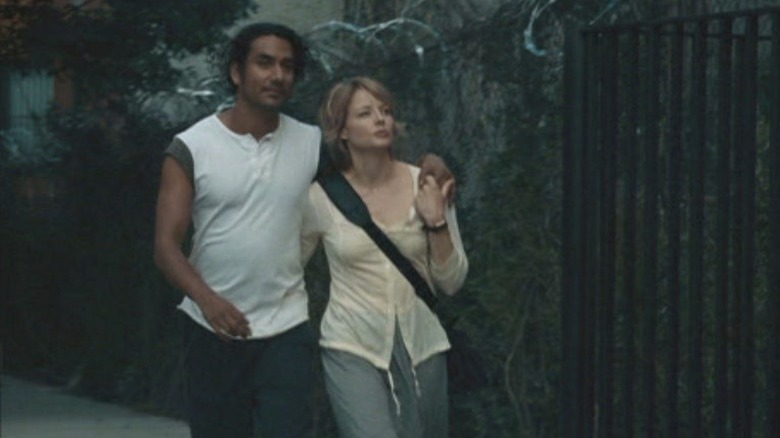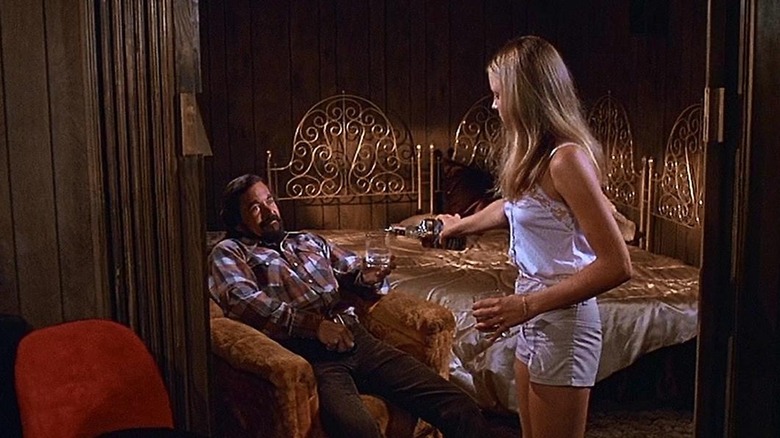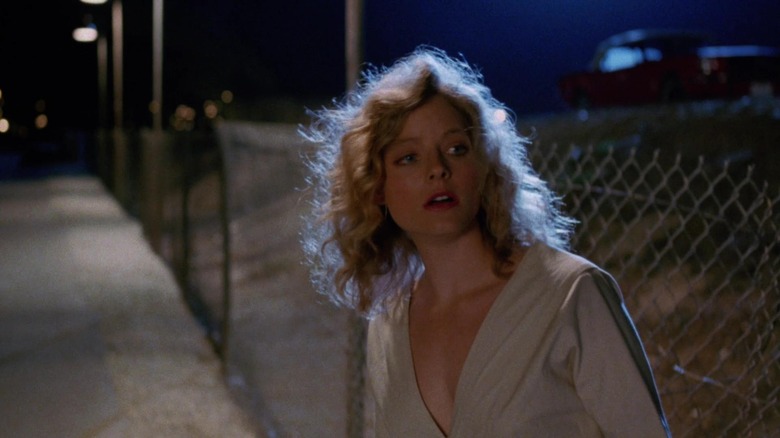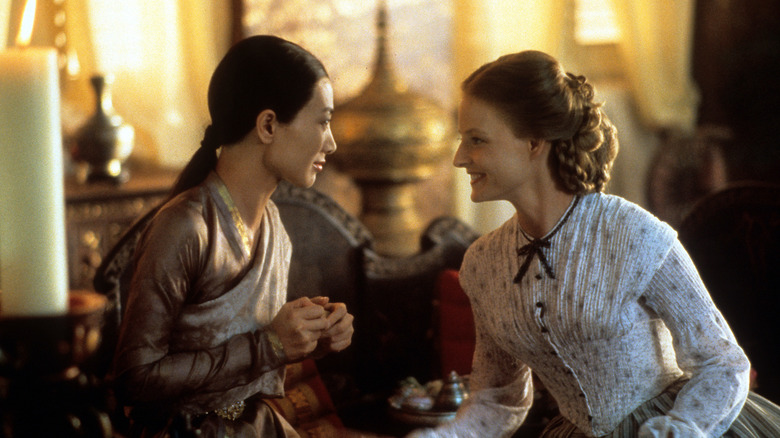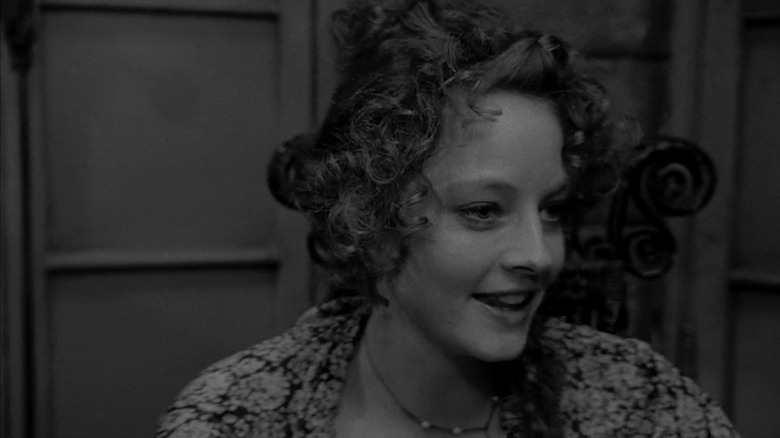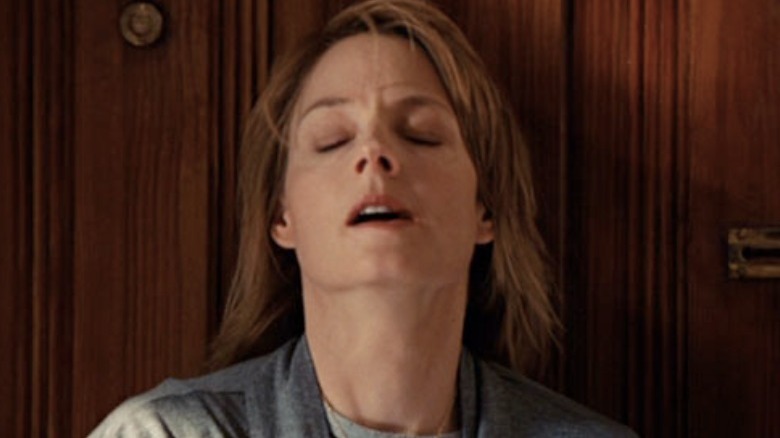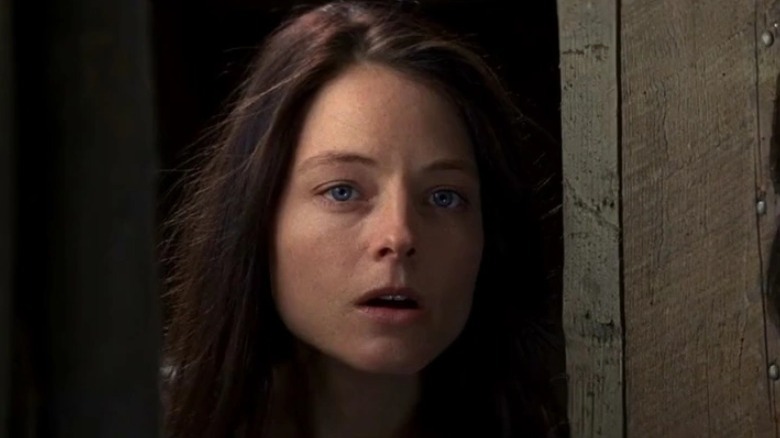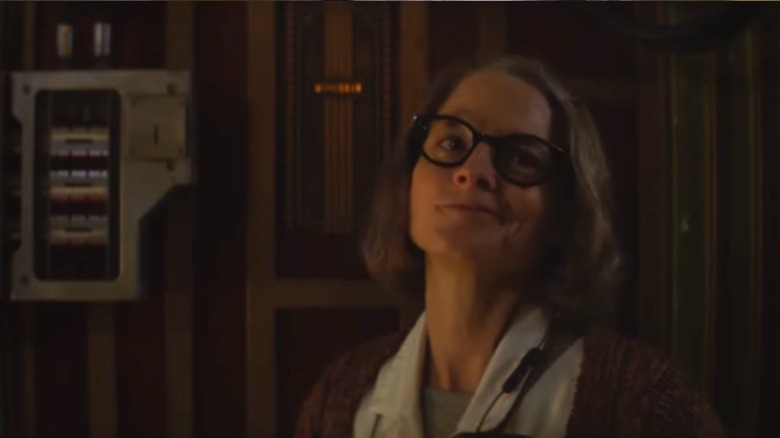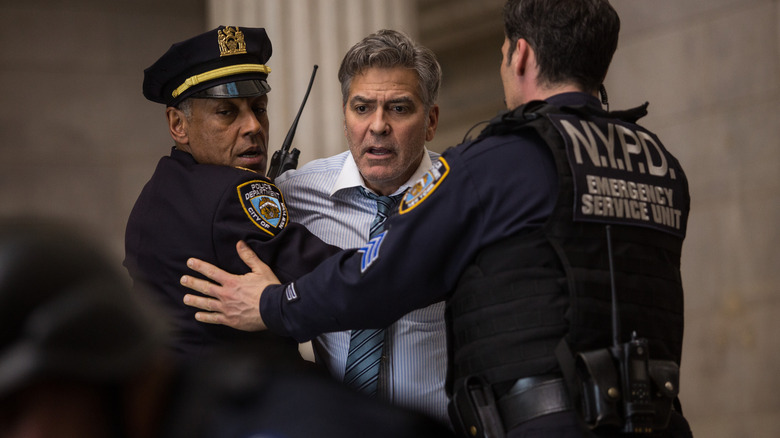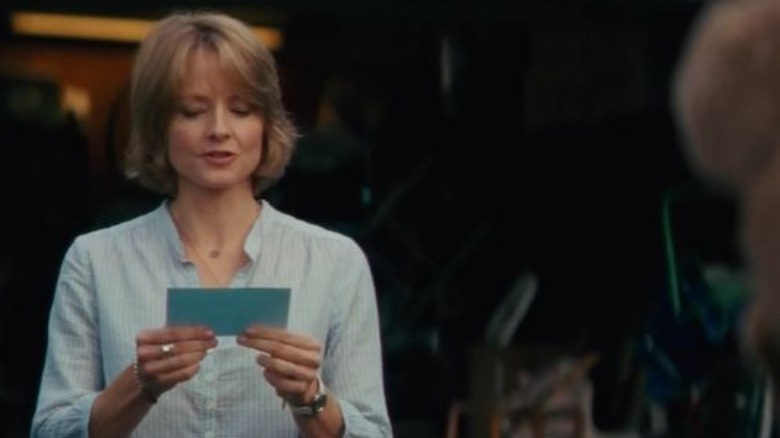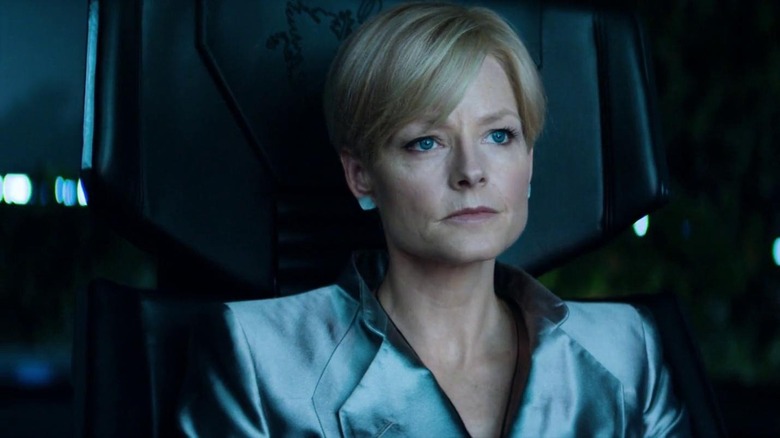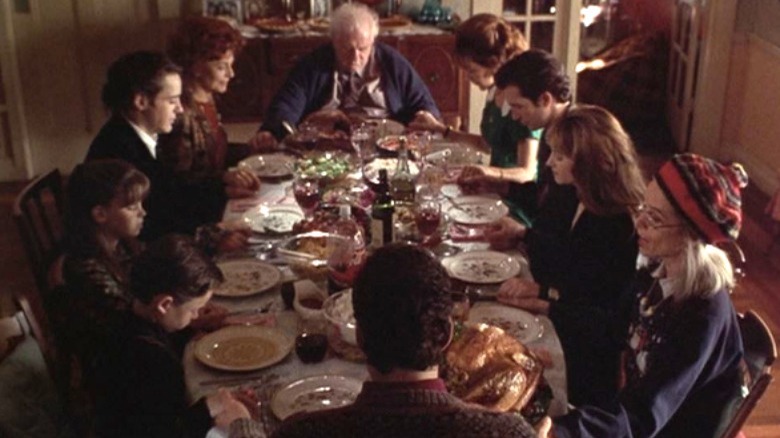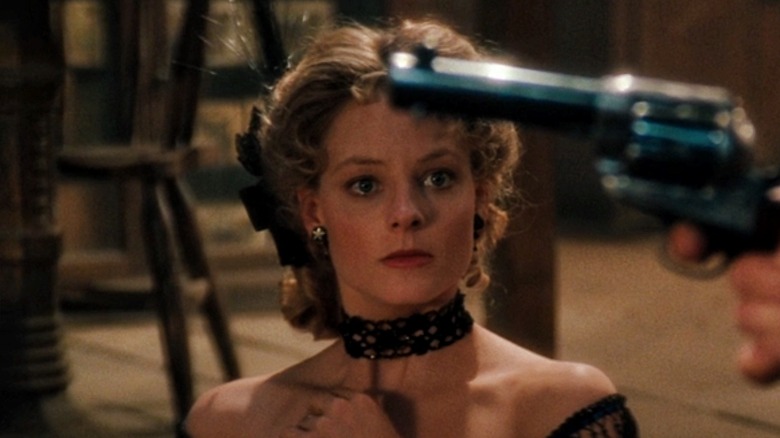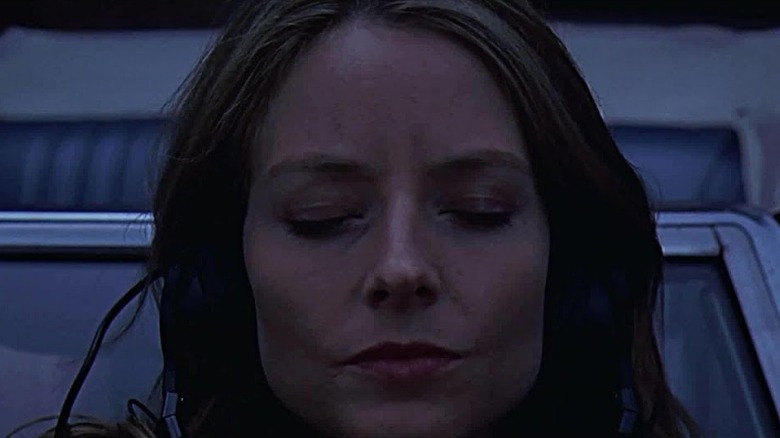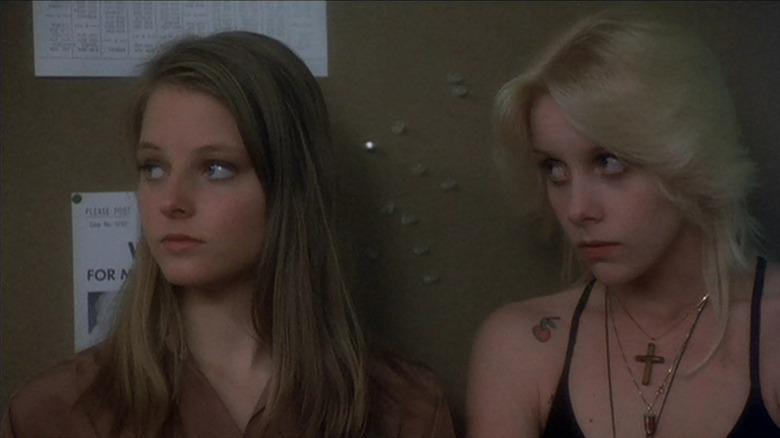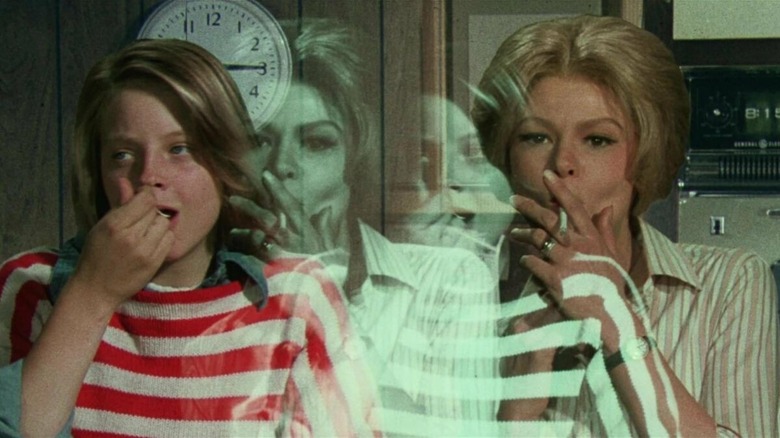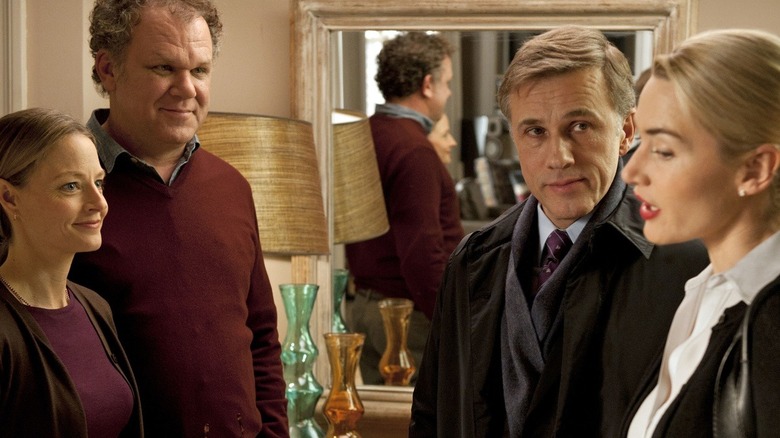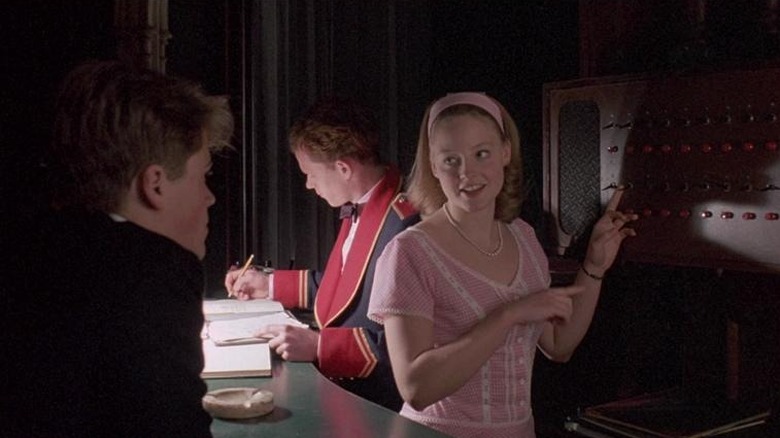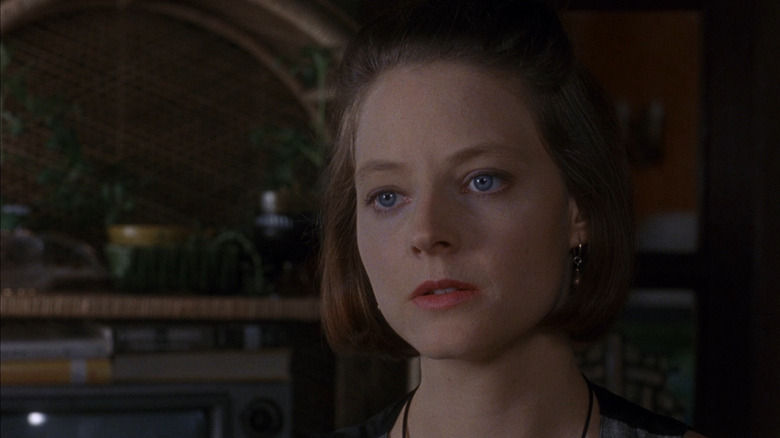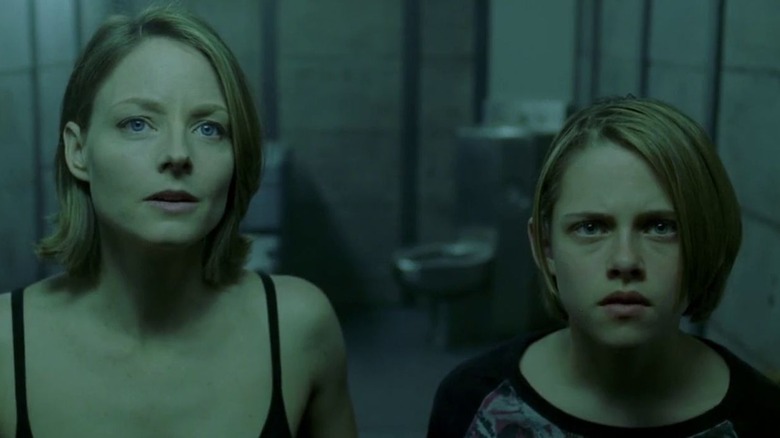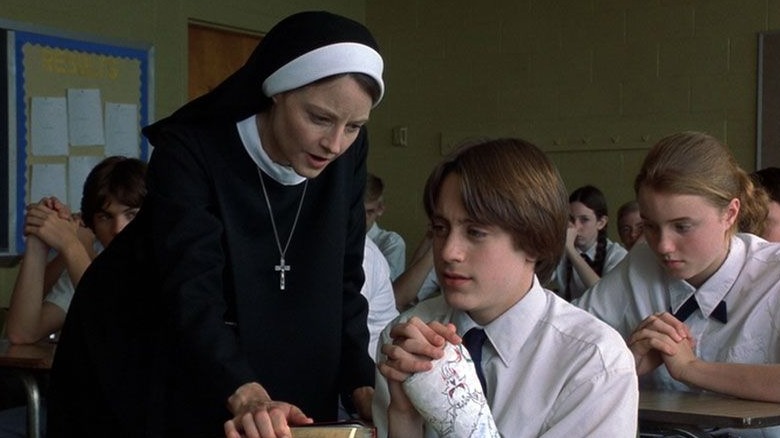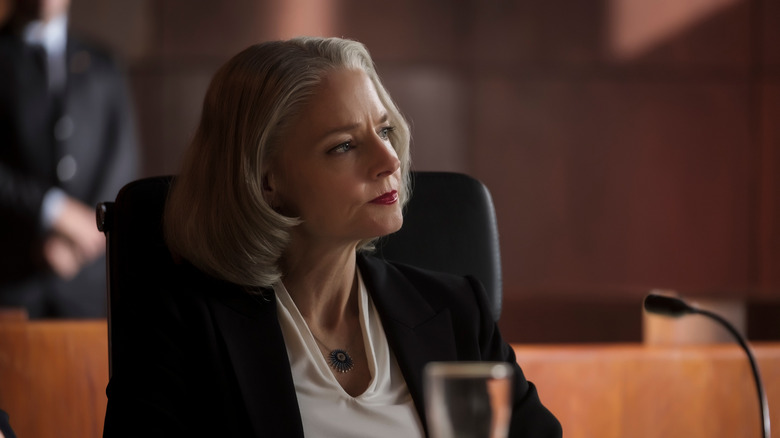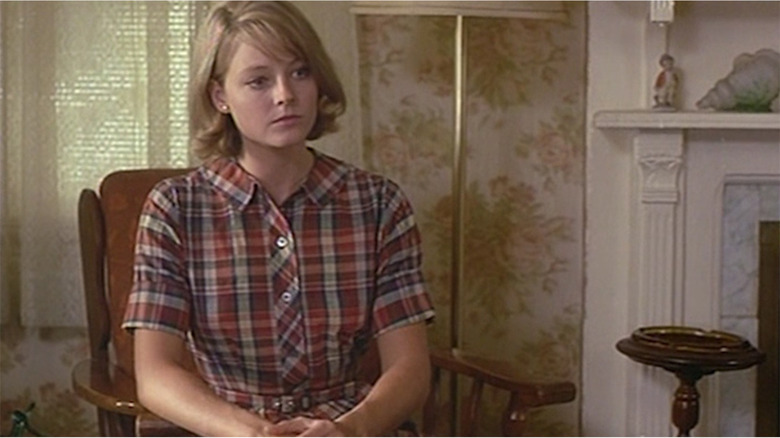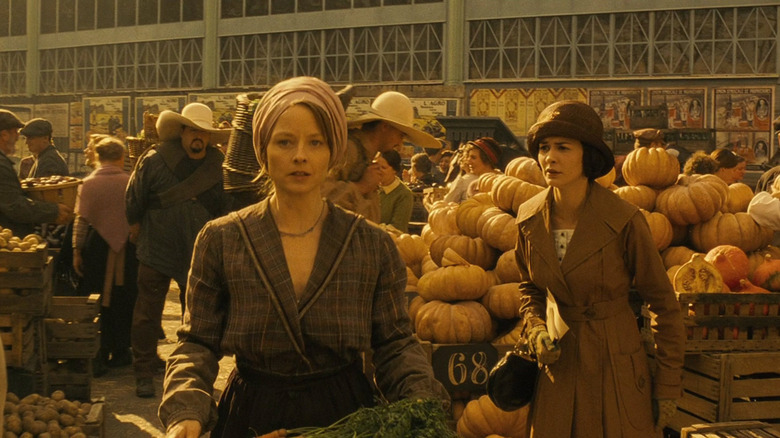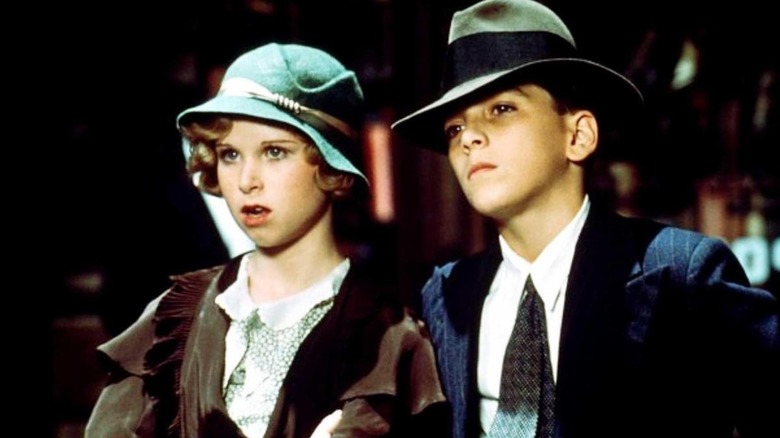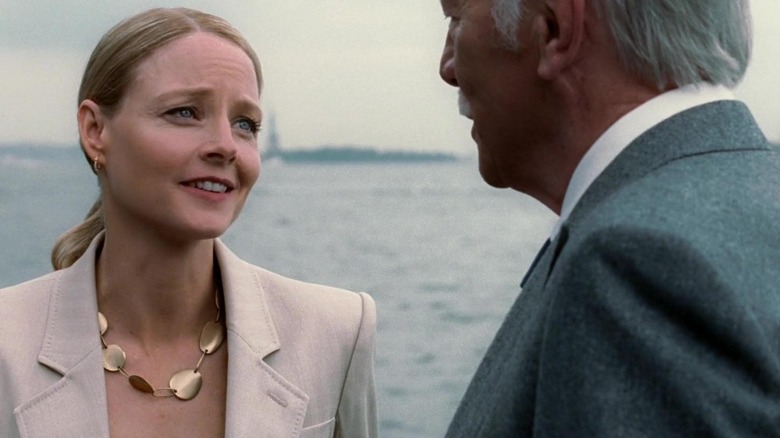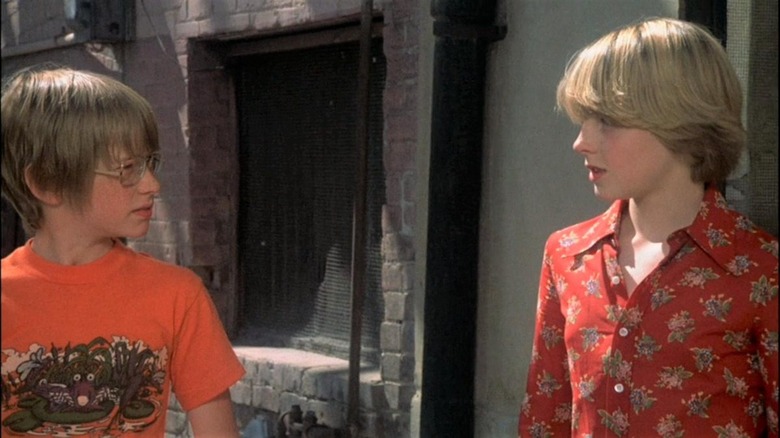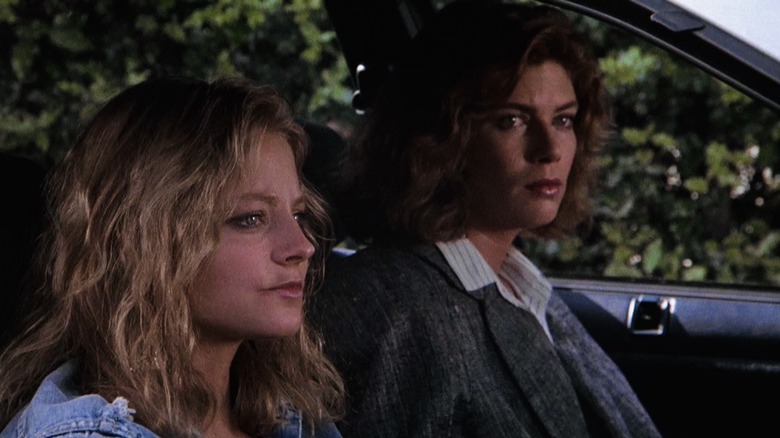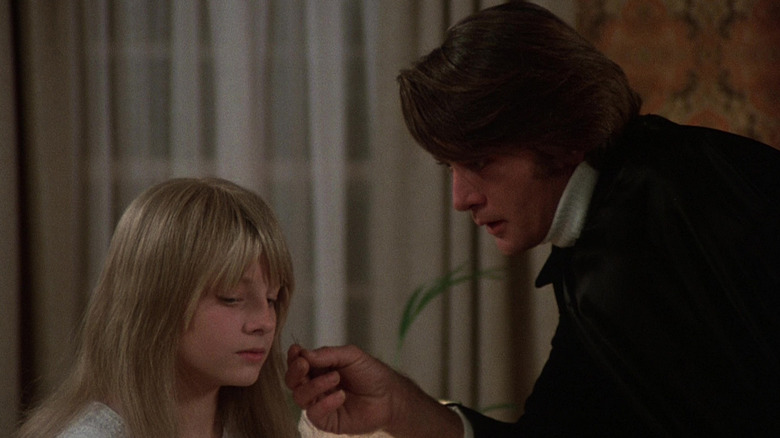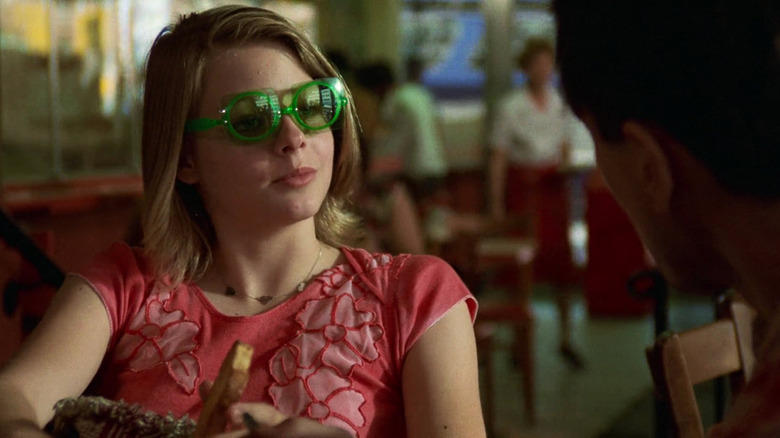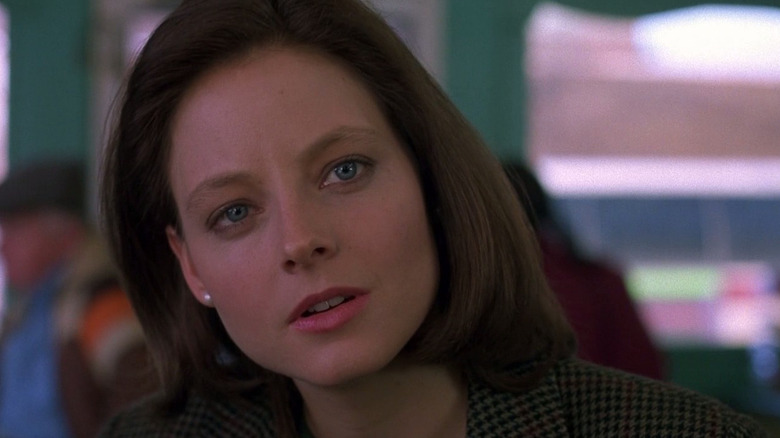Every Jodie Foster Movie Ranked Worst To Best
It's impossible to pick just one favorite Jodie Foster performance. Ever since getting her start as a child actor in the 1970s, Foster has sustained a steady and prominent acting career that now spans decades. Her films cover countless genres and have seen her inhabiting characters ranging from an antagonistic nun to an FBI agent on the hunt for a serial killer and even the owner of a hotel for assassins.
Embracing an unpredictable career path, not to mention an unwavering commitment to films that tackle heavy storytelling material, means you can never predict just what Foster is going to do next. Of course, given that she's appeared in well over 30 movies since the 1970s, not every title she's acted in has been a winner, but even her misfires tend to reflect commendable ambition.
These qualities make ranking all of Jodie Foster's movies from worst to best based on critical reception a daunting but exciting task. Engaging in these exercises reveals some obscure duds that Foster headlined in the 1970s and 1980s, but even more so, it makes it apparent that Foster has a remarkable track record for appearing in projects that are all, at the very least, memorable. It may be difficult to pick one Jodie Foster performance better than the rest, but it's quite easy to appreciate Foster's gifts as a performer, especially when ranking her acting credits from worst to best.
34. Siesta
"Siesta" was not a critically-acclaimed movie, but director Mary Lambert can hold her head high knowing that at least it wasn't a routine entry in the canon of poorly-received cinema. A 1987 mystery movie that paired up Jodie Foster with Ellen Barkin and Gabriel Byrne, "Siesta" made heavy use of dreamy sequences and experimental flourishes that made it undeniably distinctive.
Janet Maslin of The New York Times summed it up well in her review of "Siesta" by noting upfront that the movie was bad but that its ambitious and unorthodox touches made it much more memorable than most other subpar pieces of cinema. Even with less than stellar marks, "Siesta" at least served as another example of Foster taking on movies that were anything but ordinary.
33. Stealing Home
Long before he was headlining decades worth of "NCIS" episodes, Mark Harmon was starring in movies, with one such project being the 1988 romantic drama "Stealing Home." This project paired him up with Jodie Foster under the direction of Steven Kampmann, though none of these artists could manage to save "Stealing Home" from being critically-reviled.
No less than Roger Ebert declared that he "detested" every single scene of the film while pinpointing that the primary problem was how the story was wall-to-wall sappiness devoid of engaging characters. Needless to say, there were no demands for further collaborations between Mark Harmon and Jodie Foster after this critical disaster.
32. Flightplan
Jodie Foster took to the skies to deliver thrills to moviegoers with the 2005 feature "Flightplan." Hailing from director Robert Schwentke, "Flightplan" was, along with fellow 2005 airplane thriller "Red Eye," a handful of thrillers made in the mid-2000s designed to build on the general public's anxiety over flying in the wake of the 9/11 terrorist attacks. However, the only thing moviegoers had to worry about with "Flightplan" was tedium.
Reviews were harsh for this motion picture, with Moira Macdonald of The Seattle Times expressing disappointment over how "Flightplan" dovetailed from being something interesting in its first half to embracing generic and implausible bits of melodrama in its home stretch. While commenting that Foster "singlehandedly keeps 'Flightplan' watchable," her dismissive response to "Flightplan" embodied the general reception to this thriller.
31. The Brave One
There have been a lot of vigilantes in the history of cinema, ranging from Charles Bronson's Paul Kersey to the various incarnation of Frank Castle and his alter-ego, the Punisher. Jodie Foster threw her hat into this crowded ring with her work as a radio host turned crime fighter in "The Brave One."
Unfortunately, reviews for this title were decidedly negative, despite near-universal praise for the work delivered by Jodie Foster. The uncomfortable moral underpinnings of the story turned many critics off, while the lack of truly exciting action or chase scenes further alienated audiences. Surprisingly, though, a largely disregarded action movie like "The Brave One" did manage to get one major piece of award season attention in the form of Jodie Foster, who secured a Golden Globe nomination for best actress in a drama. In this one respect, being a vigilante did pay off for Foster.
30. Carny
The old-fashioned notion of throwing your cares away and running off to join the circus was the crux of the 1980 film "Carny." Jodie Foster was the character angling to leave rudimentary life behind for the big top in the film, with Gary Busey and Robbie Robertson around as the male leads.
The general critical reception to the film was sharply divided, and Robert Ebert was among those who critiqued the project for not making full use of all its potential. Still, others found merit in the feature, with Graeme Clark of The Spinning Image commending, among other virtues, how the film was an early indicator that Foster was open to taking risks as a performer.
29. Catchfire
You didn't need to look at the reviews for the 1990 movie "Catchfire" to know this project was a turkey. Before its release, director Dennis Hopper disowned the final product and, to further distance himself from the endeavor, credited himself only as Alan Smithee, per Showbiz411. Critics were generally as displeased as Hopper, with a review from Variety expressing displeasure at how disjointed the story was and how the acting was all over the map. However, praise was reserved here for Foster for being "strong, shrewd, and sexy."
If there was a silver lining here, it's that Hopper's original three-hour vision for "Catchfire" was eventually released on home video in 1992 under the title "Backtrack."
28. Anna and the King
Released in December 1999, "Anna and the King" is a period piece epic starring Jodie Foster and Chow Yun-fat set in Thailand. An expansive scope and buzzy names in the lead roles couldn't help this movie avoid getting hit with mixed reviews from critics.
The primary sticking point here was the lack of originality in the drama, which many saw as being cribbed from earlier projects like "The King and I" and a clumsy third act that failed to build on the movie's potential. The work by cinematographer Caleb Deschanel was often praised, although there were similarly consistent mixed notes directed towards Foster's performance, which many saw as not fitting well into a period piece setting.
27. Shadows and Fog
While Woody Allen's 1991 movie "Shadows and Fog" was rooted in the style and conventions of German Expressionist directors like F.W. Murnau, its cast decidedly leaned on beloved names from then-modern cinema. Jodie Foster was just one of many famous faces to show up in the cast, with Kathy Bates, John Cusack, and Lily Tomlin also making appearances.
Unfortunately, none of these big names could help "Shadows and Fog" evade critical indifference, with the consensus being disappointment over how precise filmmaking had been wasted on a forgettable script. Even Allen would later express significant disappointment in the project in his memoir "Apropos of Nothing." According to The Guardian, which refers to the "Shadow and Fog" as Allen's biggest flop, Allen wrote, "The filming of 'Shadows and Fog' came off without a hitch except for the movie."
26. Nim's Island
In April 2008, a kids' movie starring Abigail Breslin and Gerard Butler wouldn't have sounded like a ludicrous proposition. After all, these two were hot off mid-2000s hits "Little Miss Sunshine" and "300," respectively, and a family-friendly title like "Nim's Island" could be seen as a safe bet. Much less expected to be a part of this project was Jodie Foster, who played one of the film's lead characters, an author with agoraphobia who goes on an adventure.
The unexpected casting of such an acclaimed performer wasn't enough to make "Nim's Island" a critical darling. The project ended up scoring mixed marks thanks to its largely forgettable execution of a family storyline. There were also wildly varying opinions on whether or not Foster was successful in inhabiting the over-the-top caricature she was handed to play. Perhaps there was a reason Foster didn't sound like a natural fit for this project.
25. Nell
If there was any part of Michael Apted's "Nell" that was generally well-received, it was Jodie Foster's lead turn as the titular protagonist. Not only did Foster score high marks from critics for her work in "Nell" – she also was the sole facet of the feature that got major award season recognition, including nominations for best actress from the Screen Actor's Guild Awards and the Academy Awards.
The movie as a whole, though, didn't quite go the distance, with critics giving it mixed reviews and widely believing that it opted for safe and ultimately stale narrative terrain. Critics felt that "Nell" failed to fully explore its central premise, which concerns a woman who has to interact with humans for the first time after being isolated her whole life, to its most interesting potential. At least Foster fans got one of her more acclaimed 1990s performances here.
24. Hotel Artemis
When Jodie Foster does engage in an acting role in the 21st-century, it's usually on a project with a big auteur or something tackling a very weighty sociopolitical issue. For "Hotel Artemis," however, Foster embraced the opportunity to star in a cheesy action movie about a bunch of assassins helmed by first-time director Drew Pearce.
A far from expected place to spot Foster, the project scored some fans for its low-key nature and the subversive use of performers like Foster in roles that ran counter to their star image. However, others critiqued "Hotel Artemis" for not doing enough with its starting concept and not being creative enough to hide its low-budget restrictions. Though not universally beloved, "Hotel Artemis" did demonstrate that Foster was still as capable as ever of taking on surprising roles.
23. Money Monster
For her fourth feature-length directorial effort, "Money Monster," Jodie Foster decided to get topical. This 2016 movie is centered on a smarmy TV financial expert played by George Clooney who is held hostage by a working-class man (Jack O'Connell) left in financial ruin by this host's advice. The basic premise had a lot of potential for confronting the economic frustrations of America living in a world forever shaped by the 2008 financial crisis.
Unfortunately, while not exactly racked over the coals by critics, "Money Monster" received mixed marks. The primary issue highlighted in many negative reviews for "Money Monster" was the screenplay by Jamie Linden, Alan Di Fiore, and Jim Kouf. Jen Chaney of Uproxx summarized these critiques by emphasizing the presence of an erratic tone in "Money Monster" and how often the distinct personalities of the characters are suffocated by expository dialogue. Even while centering on urgently relevant material, Foster just couldn't make "Money Monster" a movie rich in quality storytelling.
22. The Beaver
From the outset, "The Beaver" looks like a movie impossible to pull off. It's a dark drama about a man's mental health centered around that same person communicating with a beaver puppet he refuses to take off his arm. Oh, and this protagonist is portrayed by Mel Gibson.
This third directorial effort from Jodie Foster (who also co-starred in the film) sounded like utter lunacy, though a fair number of critics found "The Beaver" to be more successful than disastrous. Among the detractors, though, there was a recurring complaint that "The Beaver" struggled to be as distinctive as its starting concept. Anna Smith of Metro, for instance, found redeeming qualities scattered throughout the motion picture but expressed frustration over how the story would've been better served with a more intimate atmosphere. Foster couldn't quite pull off "The Beaver," but she also didn't go down in flames trying.
21. Elysium
With his feature-length directorial debut, "District 9," director Neill Blomkamp worked with a low budget and a largely unknown cast. However, thanks to that film becoming a box office and award season success, his follow-up project, "Elysium," was a much bigger affair that scored sizeable names like Matt Damon and Jodie Foster.
While expanded in size and scale, "Elysium" couldn't quite replicate the critical success of "District 9." Critics appreciated its unique visual flourishes and aspects of the world-building but felt that the sociopolitical commentary and storytelling fell flat. Perhaps most controversial in the film was Foster's accent, which The Dissolve notes sparked widespread debate over what dialect it was supposed to be emulating. Her work here was one of several elements in "Elysium" that kept it from being the next "District 9."
20. Home for the Holidays
"Home for the Holidays" was the second time Jodie Foster stepped behind the camera as the director of a feature-length movie, but it would be her first time doing so without also being the lead in front of the camera.
Tasked now exclusively with off-screen duties and working with leading lady Holly Hunter, "Home for the Holidays" ended up scoring mixed reviews but also had its share of aficionados who appreciated its upsides. This included a retrospective review from Emily Sears for Birth.Movies.Death which complimented this often-wacky comedy for capturing the complicated nature of familial dynamics during the holidays and the wistful memories informing annual attempts to bring massive families under one roof for these events. While others found its humor to be more strained than relatable, "Home for the Holidays" did strike a chord with many viewers.
19. Maverick
In the 1990s, star-studded takes on classic TV shows were all the rage and manifested in projects as varied as "Mission: Impossible" and "The Beverly Hillbillies." With this trend in full force, it was inevitable that this classic Western program, "Maverick," would get transformed into a splashy motion picture, complete with Jodie Foster in the female lead in one of her first turns after "The Silence of the Lambs."
The eventual critical marks for this endeavor were far from perfect, but many found enough fun in this glossy affair to make it a fine diversion. Committed performances from cast members like Foster and James Garner were repeatedly highlighted as key reasons for "Maverick" working, with The New York Times praising this aspect as infusing an endearingly fun atmosphere into the whole project. Thanks to the solid work of folks like Foster, "Maverick" scored a much better critical response than many other film adaptations of vintage TV programming.
18. Contact
Space. It's a domain that's always fascinated people. It's also been a backdrop for some of the biggest movies of all time. Jodie Foster and director Robert Zemeckis were also familiar with box office phenomenons in their own unique ways in the 1990s, thanks to "The Silence of the Lambs" and "Forrest Gump," respectively.
The duo teamed up for the 1997 film "Contact," based on a novel by famed astronomer Carl Sagan, which critics felt didn't quite live up to the hype. Still, the film definitely had its advocates, many of whom fell for the movie and its poignant approach to a straightforward exploration of the endless cosmos that has always captivated humanity.
17. Foxes
Adrian Lyne became one of the more memorable directors of the 1980s and 1990s through directing an eclectic group of titles ranging including "Flashdance," "Fatal Attraction," and "9 1/2 Weeks." Before all those productions, though, there was his feature-length directorial debut "Foxes," which was headlined by Jodie Foster.
Though far from universally acclaimed, "Foxes" did generally score strong marks from critics, with the authenticity of the teenage protagonists and the performance from Foster being the highlights of the most positive reviews. While critiques over a messy tone were also prominent, "Foxes" garnered enough approving notices to signal the arrival of Lyne as a talent worth watching out for.
16. Freaky Friday
Variety is the spice of life, so they say. Nobody knows that better than Jodie Foster. The same year her entire career changed with a supporting role in "Taxi Driver," she also headlined the family-friendly Disney comedy "Freaky Friday."
A seminal entry in the body-swapping comedy subgenre, "Freaky Friday" scored better than usual reviews for a live-action Disney title from the 1970s, a category that includes derided titles like "One of Our Dinosaurs Is Missing." However, there was also widespread agreement that the film couldn't live up to its potential, a quality one can attribute to "Freaky Friday" having to hit the requisite beats for a live-action Disney family movie. Still, some of the gags were praised for being inventive, while the performances of cast members like Foster were commended for giving the goofy material more weight than expected. It was no "Taxi Driver," but "Freaky Friday" was far from a blemish on the career of Jodie Foster.
15. Carnage
Sometimes, Jodie Foster is the big-name draw in a movie's cast. In the case of "Carnage," though, Foster was one of four big names that this movie centered on. The story of two groups of parents coming together to talk after their sons have a skirmish, "Carnage" also starred Christoph Waltz, John C. Reilly, and Kate Winslet.
Based on a play penned by Yasmina Reza and adapted for the screen by Roman Polanski, "Carnage" drew generally positive reviews. Foster and Winslet were widely singled out as the best parts of the cast, while the stripped-down nature of this project (stemming from its stage-bound origins) gave the duo lots of juicy dialogue to deal with. The biggest recurring complaint here, as documented by Film Comment, was that the film didn't offer much for audiences to chew on thematically, with only performances like Foster's lingering once the credits finished rolling.
14. The Hotel New Hampshire
If you think your family is peculiar, just be grateful they're not the eccentric hotel-owning Berry clan at the center of "The Hotel New Hampshire." Jodie Foster plays Franny Berry in this feature, while Rob Lowe and Beau Bridges, among others, portray her family members.
This unusual blend of comedy and drama from writer/director Tony Richardson proved to be generally well-liked by critics, with a review from Variety reserving special praise for how the motion picture committed fully to a thoroughly idiosyncratic tone. Even this positive review remarked that such a unique concoction would not be to everyone's tastes, which was reflected in negative reviews like one from The New York Times that declared "The Hotel New Hampshire" to be merely "exhausting." Interacting with family can be full of severe ups and equally severe downs. The critical response to "The Hotel New Hampshire" was similarly all-over-the-map.
13. Little Man Tate
Jodie Foster went from being just a performer to also being a director of feature-length projects with "Little Man Tate" in 1991. This momentous career shift is one that many actors have undergone before, though it's taken many more than just one directorial effort before they score critical acclaim.
Luckily for Foster, "Little Man Tate" kicked off her filmmaking career with strong marks from critics. Bill Cosford of The Miami Herald praised the feature for its engaging nature and especially the realistic rapport between lead actors Foster and Adam Hann-Byrd. While other reviewers, such as David Ansen of Newsweek, complained that the project was too melodramatic for its own good, the general assessment of this feature was a positive one. With this largely well-received debut, Foster graduated from actor to filmmaker with immediate success.
12. Panic Room
David Fincher has become so widely associated with award season darlings like "The Social Network" and "Mank" that it can become difficult to remember that this is also the man who can deliver a crackling good thriller. Projects like "The Game" and "Gone Girl" are so compelling because Fincher applies not just his expert craftsmanship to these works but weaves in unapologetic entertainment and mayhem.
"Panic Room" was another example of Fincher's gift for making well-received genre fare, with this particular foray into this territory scoring Jodie Foster as a leading lady. While some found the concept too preposterous to work properly as a thriller, many felt engaged by "Panic Room." Throughout the movie, Fincher's filmmaking skills excel within the restrained confines of the story (which primarily takes place in a small number of locations) and Foster's engrossing lead performance.
11. The Dangerous Lives of Altar Boys
For "The Dangerous Lives of Altar Boys," Jodie Foster was playing not a protagonist whose eyes the audience was seeing a story through, but rather the antagonistic nun to a pair of parish schoolboys played by Emile Hirsch and Kieran Culkin. This unique part gave Foster a chance to further reinforce her range as a performer and add another well-reviewed movie to her resume.
"Altar Boys" got primarily good notices from critics, with Stephen Holden of The New York Times, for instance, lending praise to the project for, among other upsides, the way it emphasized the vulnerability of its adolescent protagonists. Other aspects of the film, like recurring pieces of animation from artist Todd McFarlane, were more divisive, but "The Dangerous Lives of Altar Boys" was largely a well-liked affair.
10. The Mauritanian
"The Mauritanian" had its share of critics, with many finding the project to have a story whose narrative scope exceeded its grasp. However, it had an even greater number of defenders, with the stellar performances of actors like Tahar Rahim and the unflinching indictment of America's torture of terrorist suspects being key points of praise. If there was one part of the project that never failed to drum up enthusiasm across all reviews, though, it was Jodie Foster's turn as the lawyer hired to defend a potentially innocent detainee at Guantanamo Bay.
Not only did critics fall for Foster's performance, but it became a staple of the award season circuit, with the performer even winning a best supporting actress Golden Globe for her role in "The Mauritanian." Over four decades after "Taxi Driver," Foster remains more than capable of garnering enthusiasm for her work as an actor.
9. Five Corners
Screenwriter John Patrick Shanley has penned a wide range of movies, including his Oscar-winning script for "Moonstruck," his adaptation of his stage play "Doubt," and the infamous Jamie Dornan bumblebee movie "Wild Mountain Thyme." Also part of his filmography is the script for "Five Corners," a feature set in New York in the 1960s that follows a quartet of young individuals (one of whom is played by Jodie Foster) that range from a wannabe civil rights activist to a rapist fresh out of prison.
"Five Corners" didn't deal with easy material, but it did manage to impress many critics. Film critic Cathy Burke, for example, praised "Five Corners" for handling so many tones at once and managing to find a significant purpose for all its random details, including a penguin. The presence of such an inexplicable bird may sound baffling, but committing to those sorts of unique elements is what made "Five Corners" special to certain critics.
8. A Very Long Engagement
"A Very Long Engagement" is a romantic war drama centered around actress Audrey Tautou, who plays a woman searching for her soldier fiancé after he vanishes in the trenches of World War 1. A French feature from "Amelie" director Jean-Pierre Jeunet, Jodie Foster was the most prominent American performer in the film's sprawling cast. As such, her supporting presence here wasn't a fixture of many of the responses to "A Very Long Engagement."
However, what was widely talked about in the film's many positive reviews was the project's ambitious scope. Beyond that, Neunet's trademark stylized visual approach and the lead performance from Tautou were also widely praised, helping turn "A Very Long Engagement" into a critical darling.
7. Bugsy Malone
With the traditional studio musical dying out towards the end of the 1960s, the genre entered an extremely unpredictable period starting in the 1970s. Anything could happen here, which allowed titles like "All That Jazz" and "Grease" to deliver musical numbers that made the sexual undercurrent of classic musical movie tunes very apparent. It also allowed for something as strange as "Bugsy Malone" to exist.
"Bugsy Malone" is perhaps best described as a gangster movie musical, a combo rarely seen outside of the one extended musical performance featured in "The Band Wagon." That classification might be enough to make this film stand out, but "Bugsy Malone" was also a movie exclusively featuring adult characters portrayed by child performers. Jodie Foster was just one of many adolescent actors here headlining a thoroughly strange project that, in perhaps the most peculiar twist of all, the film was released to wide critical acclaim.
Affirmative notices were common for "Bugsy Malone," especially with regard to Jodie Foster's central performance. At the very least, the creative flexibility of the musical movie in the 1970s allowed something this idiosyncratic to make it to theaters.
6. Inside Man
A tantalizing creative collaboration between director Spike Lee and Jodie Foster, "Inside Man" was a star-studded affair even beyond the presence of Foster. Anchored by Denzel Washington and featuring the likes of Clive Owen, Christopher Plummer, and Willem Dafoe in critical supporting roles, this was a movie with as many stars as the night sky.
That combination of talent led to a movie that critics found themselves enamored with, particularly with the sublime camerawork and editing. Spike Lee had long proven his chops with grounded dramas, but "Inside Man" solidified that he also had a gift for crackling good popcorn entertainment.
5. Alice Doesn't Live Here Anymore
In one of her earliest film roles, Jodie Foster worked with one of the all-time great cinema masters, Martin Scorsese, for the first time. This pre-"Taxi Driver" collaboration occurred with "Alice Doesn't Live Here Anymore," with Foster playing a supporting role in a cast anchored by Ellen Burstyn and Kris Kristofferson.
Understandably, given her smaller presence in the feature, the positive reviews for "Alice Doesn't Live Here Anymore" did not linger on Foster. Instead, the primary point of praise here was Burstyn's lead performance as well as the insightful and empathetic gaze that Scorsese used to capture the female leads of this story. However, the film remains an essential part of Foster's catalog, if only for how it established a working relationship with Scorsese that would culminate in her appearance in "Taxi Driver."
4. The Accused
"The Accused" is a courtroom drama about a rape survivor (Jodie Foster) attempting to prosecute her rapists. Decades after the film first hit theaters, lead performer Kelly McGillis disclosed to The Hollywood Reporter that she knew the movie had impacted audiences through the numerous instances she'd been told by women that "The Accused" helped them talk about their history of being sexually assaulted.
The urgent subject matter of "The Accused" was realized in a captivating and acclaimed fashion that put the voice of rape survivors at the forefront of the narrative. Further proving just how much this production had resonated with people, "The Accused" managed to win Jodie Foster her first of two Academy Awards for best actress. Most importantly, though, "The Accused" offered a voice to those that society often left voiceless.
If you or anyone you know has been a victim of sexual assault, help is available. Visit the Rape, Abuse & Incest National Network website or contact RAINN's National Helpline at 1-800-656-HOPE (4673).
3. The Little Girl Who Lives Down the Lane
There is no doubt that 1976 was a massive year for Jodie Foster, as the performer appeared in five wildly different films that ranged from "Freaky Friday" to "Taxi Driver." Among that gaggle of movies was "The Little Girl Who Lives Down the Lane." Foster played the titular little girl, a figure whose isolated life and missing parents lead her to become a target of suspicion in her hometown.
This dark role was the centerpiece of a film that kept people on their toes so effectively that critics heaped praise on it. This positivity extends to contemporary opinions, with Grant Watson of Fiction Machine writing in a 2021 retrospective that "The Little Girl Who Lives Down the Lane" was an underrated title buoyed by a suspenseful atmosphere and two great lead performances from Foster and Martin Sheen. This is just the kind of response you'd expect for a movie released during one of Foster's most creatively successful years ever.
2. Taxi Driver
Some of the acclaimed movies that Jodie Foster has appeared in have faded into obscurity or gradually built up positive reputations over time. Neither of these outcomes is the case for "Taxi Driver." A 1976 directorial effort from Martin Scorsese, "Taxi Driver" is still an inescapable fixture of cinema, one whose acclaim has never subsided in the decades since its release.
A 2017 review of the film for The Guardian by Peter Bradshaw even noted that the grimy political subtext of the feature had taken on whole new layers of meaning and resonance in contemporary times. The years have been kind to "Taxi Driver" and the same can be said for Foster's work in the film as a child prostitute named Iris. Foster expressed continuing pride to ET Canada in an interview about her work in the film, which managed to be so beloved when "Taxi Driver" first came out that it scored Foster her first Oscar nomination.
Whether you're examining the film just Foster's performance or as an entire production, "Taxi Driver" hasn't lost an ounce of its power.
1. The Silence of the Lambs
With a career that spans decades, you'd think Jodie Foster would be impossible to pigeonhole into just one role. While this part hasn't overshadowed her other accomplishments as an artist, it's also difficult to imagine anyone who wouldn't immediately associate Foster with her work as Clarice Starling in the critically beloved film "The Silence of the Lambs."
While Anthony Hopkins as Hannibal Lecter became a pop culture icon, the scenes with an incarcerated Lecter breaking down clues and details with Starling wouldn't work nearly as well if Foster wasn't also delivering an iconic performance. Plus, Starling is the primary point of focus in "The Silence of the Lambs," as she provides the eyes that viewers watch this world through. She's just as engaging in trying to make her voice heard at her job as she is navigating a conversation with a serial killer.
As a cherry on top, so much else about "The Silence of the Lambs" rises to the level of Foster's performance, which is reflected in the sweep of the 1992 Academy Awards the film achieved. No wonder Foster is always connected to her work in "The Silence of the Lambs," given that this is a movie of uniquely high quality.
